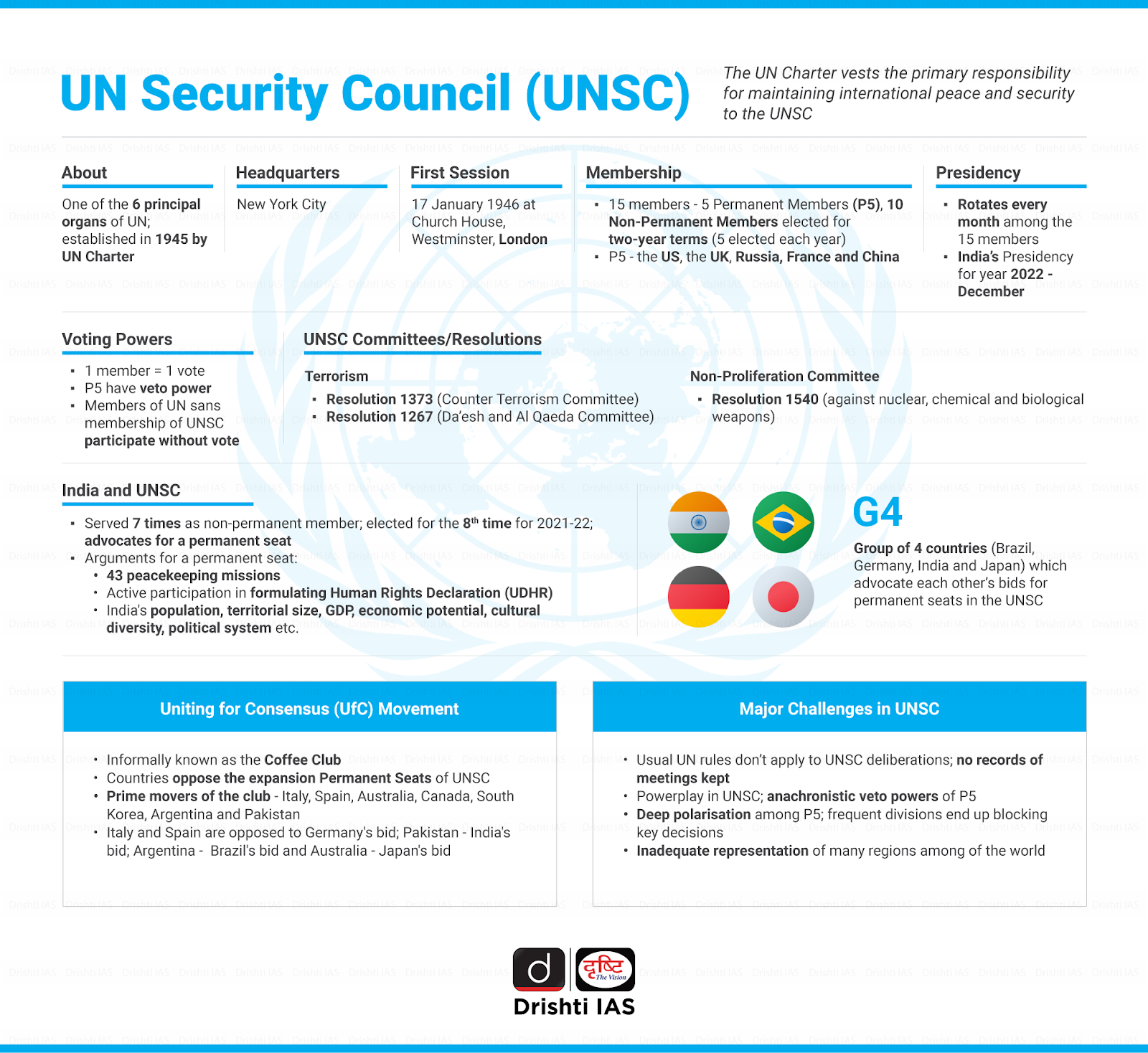New Non-Permanent Countries to UNSC | 09 Jun 2025
Source: UN
Why in News?
The United Nations General Assembly (UNGA) has elected Bahrain, Colombia, the Democratic Republic of the Congo (DRC), Latvia, and Liberia as non-permanent members of the UN Security Council (UNSC) for a 2-year term starting 1st January 2026.
- They will join Denmark, Greece, Pakistan, Panama, Somalia (elected in 2024, serving through 2026).
- Also, Pakistan has been appointed as the Chair of the UNSC 1988 Taliban Sanctions Committee for 2025 and will also serve as vice-chair of the UNSC Counter-Terrorism Committee during its 2025–26 tenure as a non-permanent member of the Council.
What is the United Nations Security Council (UNSC)?
- The United Nations Security Council (UNSC), established in 1945 under the UN Charter, constitutes one of the UN's six principal organs, entrusted with the primary responsibility of maintaining international peace and security.
- The Council comprises 15 members, including 5 permanent members (P5)- China, France, Russia, the United Kingdom, and the United States—who possess veto power, and 10 non-permanent members elected for 2-year terms by the UN General Assembly (UNGA).
- These non-permanent seats are allocated on a regional basis: 5 for African and Asian States, 1 for Eastern European States, 2 for Latin American and Caribbean States, and 2 for Western European and Other States.
- Elections are held annually through a secret ballot, requiring a two-thirds majority vote, even when candidates are unopposed.
- The UNSC remains the only UN body whose decisions member states are obligated to implement under the UN Charter.
- India's participation in the Security Council has been as a non-permanent member during the periods of 1950-51, 1967-68, 1972-73, 1977-78, 1984-85, 1991-92, 2011-12, and 2021-22.
What is the 1988 Taliban Sanctions Committee?
- About: Also known as the UNSC 1988 Sanctions Committee, it was established under UNSC Resolution 1988 (2011).
- It includes all 15 UNSC members, makes decisions by consensus, and is supported by the Analytical Support and Sanctions Monitoring Team.
- Mandate: It focuses on monitoring and enforcing targeted sanctions- including asset freezes, travel bans, and arms embargoes against individuals and entities associated with the Taliban that threaten the peace, stability, and security of Afghanistan.
- Chairs: India chaired the Committee until December 2021.
What is the UNSC Counter-Terrorism Committee (CTC)?
- About: The UNSC Counter-Terrorism Committee (CTC) was established through Resolution 1373, unanimously adopted in 2001 in the aftermath of the 9/11 terrorist attacks in the US.
- Members: It comprises all 15 UNSC members-5 permanent and 10 non-permanent members.
- Mandate: Monitor and promote the implementation of Resolution 1373, which obligates member states to:
- Criminalize terrorism financing and freeze related assets,
- Deny financial and material support to terrorists,
- Suppress safe havens, training, and sustenance for terrorist groups,
- Enhance international cooperation by sharing intelligence on terror activities.
- 2025 Chairman: In 2025, Algeria will chair the CTC, with France, Russia, and Pakistan as vice-chairs.
- India chaired the CTC in 2022, during its 2021–22 UNSC tenure, and actively highlighted concerns regarding Pakistan’s sheltering of UN-designated terrorists.
UPSC Civil Services Examination, Previous Year Question (PYQ)
Prelims:
Q. The Security Council of UN consists of 5 permanent members, and the remaining 10 members are elected by the General Assembly for a term of (2009)
(a) 1 year
(b) 2 years
(c) 3 years
(d) 5 years
Ans: (b)


